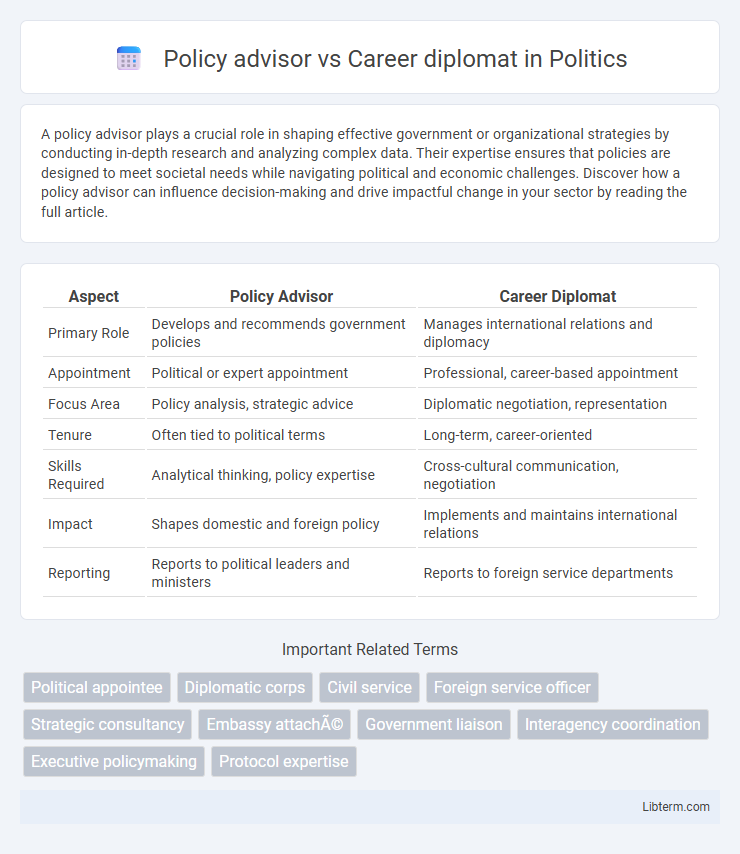A policy advisor plays a crucial role in shaping effective government or organizational strategies by conducting in-depth research and analyzing complex data. Their expertise ensures that policies are designed to meet societal needs while navigating political and economic challenges. Discover how a policy advisor can influence decision-making and drive impactful change in your sector by reading the full article.
Table of Comparison
| Aspect | Policy Advisor | Career Diplomat |
|---|---|---|
| Primary Role | Develops and recommends government policies | Manages international relations and diplomacy |
| Appointment | Political or expert appointment | Professional, career-based appointment |
| Focus Area | Policy analysis, strategic advice | Diplomatic negotiation, representation |
| Tenure | Often tied to political terms | Long-term, career-oriented |
| Skills Required | Analytical thinking, policy expertise | Cross-cultural communication, negotiation |
| Impact | Shapes domestic and foreign policy | Implements and maintains international relations |
| Reporting | Reports to political leaders and ministers | Reports to foreign service departments |
Introduction to Policy Advisors and Career Diplomats
Policy advisors specialize in developing and analyzing government policies to guide decision-making processes, often working closely with political leaders and stakeholders. Career diplomats represent their country abroad, managing international relations, negotiating treaties, and promoting national interests through long-term diplomatic missions. Both roles require deep understanding of political frameworks, but policy advisors focus on domestic policy formulation while career diplomats emphasize international engagement.
Defining the Roles: Policy Advisor vs Career Diplomat
Policy advisors specialize in developing strategic recommendations and analyzing international relations to guide government decision-making, often focusing on specific issues or regions. Career diplomats represent their country's interests abroad, managing bilateral and multilateral relations, negotiating treaties, and maintaining diplomatic protocols on the ground. While policy advisors operate primarily in governmental or think tank settings shaping policy frameworks, career diplomats engage directly with foreign counterparts to implement and adapt those policies in real-time.
Key Responsibilities and Daily Tasks
Policy advisors analyze political trends, develop strategic recommendations, and draft policy proposals tailored to governmental objectives. Career diplomats manage diplomatic relations, negotiate treaties, and represent their country abroad while ensuring adherence to international protocols. Both roles require strong communication skills, but policy advisors concentrate on shaping domestic and foreign policies, whereas diplomats focus on executing these policies through international engagement.
Required Skills and Qualifications
Policy advisors require strong analytical skills, expertise in legislative processes, and the ability to craft strategic recommendations based on complex data to influence government decisions effectively. Career diplomats must demonstrate exceptional communication abilities, cultural sensitivity, and proficiency in foreign languages, alongside a deep understanding of international relations and negotiation techniques. Both roles demand advanced degrees in political science, international relations, or related fields, but diplomats often undergo rigorous diplomatic training programs and eye practical experience in global postings.
Educational Pathways and Professional Training
Policy advisors typically pursue degrees in political science, international relations, or public administration, followed by specialized training in policy analysis, legislative processes, and strategic communication. Career diplomats often begin with university education in fields such as international law, economics, or foreign languages, complemented by rigorous diplomatic training programs at foreign service institutes focusing on negotiation, consular affairs, and cross-cultural communication. Both roles emphasize continuous professional development, but policy advisors focus more on analytical skills and policy formulation, while career diplomats prioritize diplomatic protocol and international relations expertise.
Career Progression and Opportunities
Career diplomats follow a structured progression through diplomatic ranks, starting from entry-level attache roles to ambassadorial positions, gaining extensive experience in international relations and protocol. Policy advisors often specialize in specific areas such as trade, security, or human rights, advancing by deepening expertise and influencing government policies through strategic recommendations. Both paths offer opportunities for international assignments and leadership roles, but career diplomats benefit from formalized promotion systems within foreign service institutions.
Influence on Foreign Policy Formulation
Policy advisors directly influence foreign policy formulation by providing strategic analysis, recommendations, and expertise to government leaders, shaping decision-making at the highest levels. Career diplomats contribute to policy implementation and offer ground-level insights from their extensive international experience, which can inform nuanced adjustments in foreign policy strategies. The combined input of policy advisors' analytical acumen and diplomats' practical knowledge creates a dynamic feedback loop essential for effective and adaptive foreign policy development.
Work Environment and Organizational Structure
Policy advisors typically operate within think tanks, government agencies, or political offices where hierarchical structures allow direct influence on decision-making through research and strategic counsel. Career diplomats work in structured foreign services under the Ministry of Foreign Affairs, engaging in international relations through embassy postings and multilateral organizations, often navigating formal protocols and bureaucratic environments. Both roles require adaptability but differ in workplace dynamics: policy advisors emphasize analytical collaboration within domestic offices, while career diplomats manage multicultural teams and represent national interests abroad.
Challenges Faced in Each Role
Policy advisors often grapple with the challenge of rapidly analyzing complex geopolitical information to provide actionable recommendations while balancing diverse stakeholder interests and managing tight deadlines. Career diplomats face the challenge of navigating sensitive international relations, adapting to diverse cultural environments, and maintaining consistent diplomatic protocols under pressure. Both roles require strong communication skills, but diplomats must prioritize relationship-building and conflict resolution in dynamic, high-stakes settings.
Choosing Between Policy Advisor and Career Diplomat
Choosing between a policy advisor and a career diplomat depends on one's career goals and interests in international relations. Policy advisors primarily focus on shaping and analyzing government policies, utilizing expertise in economics, law, or political science to influence decision-making processes. In contrast, career diplomats engage directly in diplomatic negotiations, representing their country abroad to foster international cooperation and resolve conflicts.
Policy advisor Infographic

 libterm.com
libterm.com